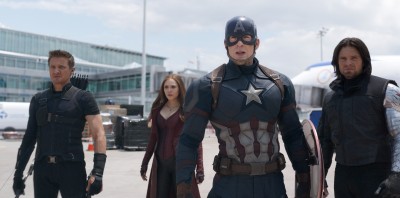
2016 seems to be the year of superheroes fighting other superheroes. In March, “Batman v Superman: Dawn of Justice” started the trend, but it was ultimately a disappointment. Now, we have “Captain America: Civil War,” which pits Iron Man against Captain America, along with plenty of other superheroes picking sides.
Thankfully, “Civil War” rights the wrongs of “Batman v Superman” and becomes not only one of Marvel’s best films, but one of the best superhero films ever made.
“Civil War” picks up shortly after the events of “Avengers: Age of Ultron” and “Ant-Man.” After a mission goes terribly wrong, the United Nations asks the Avengers to sign off on the Sokovia Accords. This agreement would place the Avengers under the oversight and control of a U.N. panel, holding them accountable for their actions.
The team is incredibly split over this decision. One thing leads to another, and eventually their conflicting ideologies lead to actual conflict between our favorite super-powered characters.
The setup and execution of having these former friends and teammates now exchanging blows is handled extraordinarily well.
The conflict builds up throughout the entire film and culminates in one of the best comic book action sequences in years. It is genuinely heartbreaking to see these relationships crumble after years of development, giving these scenes the emotional weight necessary to make the audience care.
But the film isn’t all doom and gloom. “Civil War” contains plenty of excellently timed jokes and instances of comedic relief that the Marvel Cinematic Universe is known for. The film does a remarkable job of balancing its serious and depressing subject matter with an omnipresent sense of fun.
It doesn’t strive to be taken too seriously, unlike “Batman v Superman.”
The best comedic moments come from Spider-Man’s introduction. His banter with Tony Stark — or “Mr. Stark,” as Spider-Man so often calls him — makes for many hilarious scenes. Newcomer Tom Holland depicts Spider-Man with such childish delight that it is hard not to instantly love him.
While his inclusion is a bit shoehorned in, Holland’s presence is so enjoyable that he ultimately elevates the film, like a great topping on an already amazing slice of pizza.
The other newcomer is Black Panther (Chadwick Boseman), son of the king of Wakanda, a fictional African country where vibranium — the precious metal used to make Captain America’s shield and Black Panther’s suit — is the most valuable natural resource.
Boseman does an excellent job of making his character interesting with the limited amount of screen time he’s given. Black Panther’s abilities and values are expertly displayed as a part of the natural story progression, making his upcoming solo movie that much more exciting.
While the film does focus on Captain America, “Civil War” features enough of the extended Marvel cast to really be considered an “Avengers 2.5” of sorts. The events of the film also have far-reaching impacts for the MCU as a whole, leaving many questions unanswered in regard to what could possibly come next.
Even though “Civil War” balances multiple plot threads, characters and set-ups for future films, it all feels extremely natural.
Directorial duo Joe and Anthony Russo are responsible for keeping all of the film’s parts so well organized. The brothers have also directed the previous Captain America film, “Captain America: The Winter Soldier,” which was well-received. Here, they prove that their first success wasn’t just beginner’s luck.
The Russos know how to film action sequences clearly, using dynamic camerawork that enhances the experience but never disorients the viewer. Their clever camera control is on full display in “Civil War,” as they use it to show off every aspect of the many superheroes featured in the film, as well as the interactions between their powers once the fighting starts.
The only notably weak part of the film is its main villain. While this film’s primary conflict occurs between the two groups of heroes, there is another opposing force working against them from the shadows.
Without giving much away, the antagonist ends up being extremely underdeveloped — a bad habit in MCU films.
The villain’s motivations are only revealed toward the end of the film in an incredibly underwhelming expository dialogue dump. It does not detract from the film much, mostly because the rest of “Civil War” is just too excellent to be dragged down, but it still feels like it definitely could have been cut.
“Captain America: Civil War” is not only a triumph amongst Marvel films, but for the entire superhero genre. It succeeds in ways that other films, like “Batman v Superman,” have failed so many times before. It will become the example that all protagonist-against-protagonist movies should follow. While some critics may believe superhero fatigue is setting in, “Captain America: Civil War” reminds us exactly how great these films can be.
“Captain America: Civil War” opens in theaters nationwide Friday.
























































































































